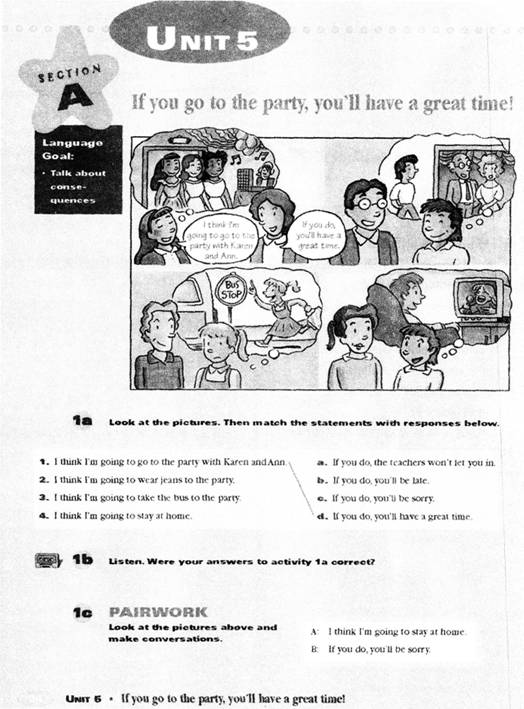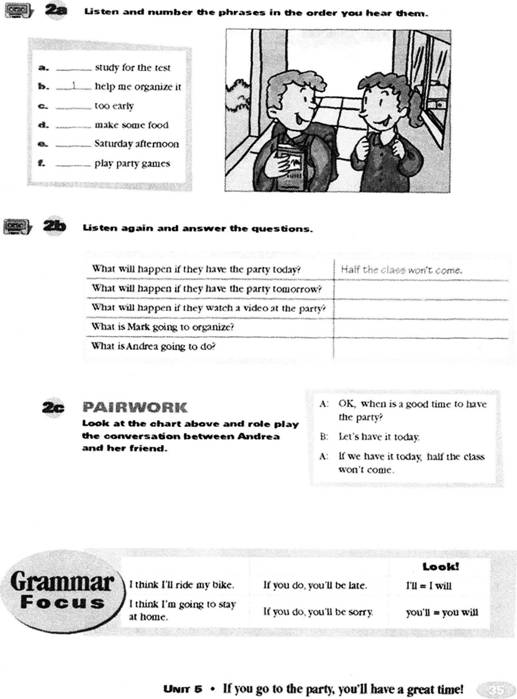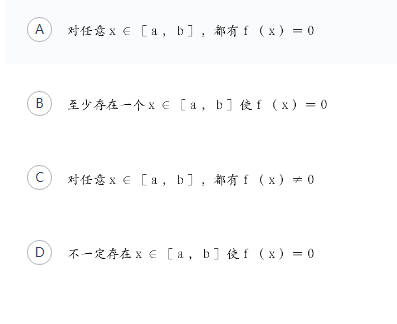当前位置:首页 → 职业资格 → 教师资格 → 中学英语学科知识与教学能力->根据提供的信息和语言素材设计教学方案,用英文作答。设计任务:
根据提供的信息和语言素材设计教学方案,用英文作答。
设计任务:请阅读下面学生信息和语言素材,设计一节英语听说课的教学方案。教案没有固定格式。但须包含下列要点:
·teaching objectives
· teaching contents
· key and difficult points
·major steps and time allocation
·activities and justifications
教学时间:45分钟
学生概况:某城镇普通中学八年级(初中二年级)学生,班级人数40人,多数已经达到《义务教育英语课程标准(2011版)》四级水平,学生课堂参与积极性一般。
语言素材:


Teaching Contents: In this listening and speaking class, students could learn the sentence pattern"if + simple present tense, ... will + simple future tense". Teaching Objectives :
(1) Knowledge objective
Students could master the key vocabularies, phrases and sentence.
Key Vocabulary :
flower, against, chance
Phrases :
let in / help sb do sth / at the party / bring from / during the party
Sentences :
①If you go to the party, you' 11 have a great time.
②If you do, you'll be late.
③What will happen if they have the party tomorrow?
(2) Abilty objective
Students could use the vocabularies and phrases to talk about conquences correctly.
(3) Emotional objective
Students should cultivate the spirit of helping and cooperating with others.
Teaching Key Points :
Master the vocabulary, phrases and sentences correctly.
Teaching Difficult Points:
Master and use the grammar properly.
Teaching Aids: Multi-media, tape
Teaching Procedures :
Step l Leading-in (5 minutes)
(1) Play flash : If you are happy.
(2) Key language :
① If you are happy, what will you do?
If I am happy, I will smile.
② What will happen if you become sad?
If I become sad, I will cry.
③ What will happen if you are going to do too much work?
If I am going to do too much work, I will get tired.
(Justification: The media will attract students' attention to the topic of the class.)
Step 2 Listening lb (10 minutes)
(1) Ask the students to look at the pictures and tell what they see.
(2) Play the tape and ask students to finish la.
(3) Check the answers.
?
statements consequences
I think l’m going to the party with Karen and Ann. If you do.you’U have a great time.
I think l’m going to wear jeans to the party. If you do,the teachers won’t let you in.
I think l’m going to take the bus to the party. If you do,you’11 be late.
I think l’m going to stay at home. If you do,you’11 be sorry.
?
(Justification: The listening activity can improve students' skill of listening for specific information.)
Step 3 Pair work (5 minutes)
Look at the picture above and make a conversation.
Key language :
A: I think I am going to stay at home.
B: If you do, you will be sorry.
A : Really ?
B: Yes, you should go to the party with me.
(Justification: Pair work could consolidate what students have learned and improve their speaking skills.)
Step 4 Listening 2a and 2b (10 minutes)
(1) Ask a student to read the six phrases.
(2) Play the recording for the first time. Ask students to grasp the main idea.
(3) Listen again and number the phrases in the order.
(4) Read the questions about the party.
(5) Listen again. Finish 2b.
(6) Check the answers.
(Justification: The listening activity can improve students' skill of listening for specific information again. )
Step 5 Group work (10 minutes)
(1) Ask students to work in groups. They are required to make a plan for the spring travel. Discuss and decide where they are going, when they are going, and how they will get there. Then ask students to give reasons.
(2) Ask several groups to show their plan to the class.
…?
(Justification: Group work could develop students' spirit of cooperating with others and improve their speaking skills. )
Step 6 Summary and Homework (5 minutes)
Summary: Ask students what they have learned today. The teacher can give a clear summary.
Homework: Write ten sentences using the grammar they have learned today.
(Justification: The homework could cultivate the students' ability of writing.)
Blackboard Design:
Vocabularies : flower, against, chance
Phrases :
let in / help sb do sth / at the party / bring from / during the party
Sentences :
①If you go to the party, you' 11 have a great time.
②If you do, you'll be late.
③ What will happen if they have the party tomorrow?
教师职业道德区别于其他职业道德的显著标志就是( )。
在教育史上主张“不愤不启,不悱不发”的教育家是()。
心理学家所说的“危险期”或“心理断乳期”是指( )。
教育工作中做到“因材施教”、“长善救失”符合年轻一代身心发展的( )。
德育过程与品德形成过程的关系是( )。
德育过程是培养学生( )的过程。
学生从事集体活动、结交好友的场所是( )。
教师的工作目的和使命是( )。
直接决定教育目的的因素是( )。

